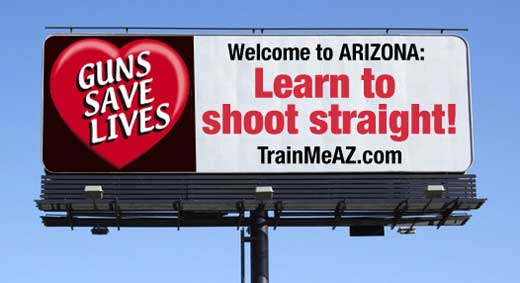BY LINDA BENTLEY | MAY 14, 2014
Court of appeals overturns Phoenix’s ban on ‘Guns Save Lives’ ads
‘It is a shame that the city of Phoenix constantly invites litigation by refusing to adhere to the state and federal constitutions’

PHOENIX – Last week, the Arizona Court of Appeals reversed the lower court’s ruling and stated the city of Phoenix unconstitutionally applied its Transit Advertising Standards to the “Guns Save Lives” campaign placed by TrainMeAZ, LLC.
The case was brought by Alan Korwin, a noted publisher of gun law books, and TrainMeAZ, LLC, the company he formed in 2010 after Arizona passed its Constitutional Carry law, allowing law-abiding adults to bear arms either openly or concealed without government interference.
Korwin formed TrainMeAZ so interested parties from around the state could join forces to promote gun-safety training, the shooting sports, self-defense awareness and exercise of the fundamental constitutional right of the people to keep and bear arms for all lawful purposes.
TrainMeAZ’s stated goal is “to advance marksmanship, safe gun handling and a deep appreciation of the valuable role firearms play in a peaceful society, on a statewide scale.”
The TrainMeAZ.com website is a valuable resource for firearms training throughout Arizona.
In October 2010, when Korwin sought to advertise his TrainMeAZ.com website as part of his “Guns Save Lives” campaign, he entered into an agreement with a third party that sold advertising space for the city of Phoenix bus shelters to post six-foot by four-foot ads on 50 of the city’s bus shelters.
The vendor agreed to post the ads without previously submitting Korwin’s advertisement to the city for review.
The ads were all placed under the city’s 2009 advertising standards and the complaint initially only challenged those standards.
Korwin later amended his complaint to challenge the standards adopted by the city in March 2011, claiming those regulations were also unconstitutionally vague and would allow for arbitrary enforcement.
While the city consistently promulgates and enforces policies restricting advertizing on its buses and bus shelters to commercial advertizing, the court stated it may impose reasonable restrictions upon speech within the nonpublic forum as long as the restrictions are not based upon the speaker’s point of view.
Since 1996, the city permitted commercial advertising on its buses, bus shelters and benches. The 2009 standards stated, in pertinent part, “The subject matter on transit buses, shelter and bench advertising shall be limited to speech which proposes a commercial transaction.”
The 2011 amendment eliminated the “shall be limited to” provision and added a requirement that a “commercial transaction must be proposed and must be adequately displayed on the transit advertising panel.”
Advertising under the TrainMeAZ.com banner directed people to the website, which displays numerous commercial resources where people may find training, ranges, gun shows, stores, etc.
Although Korwin did not resubmit his ads for review under the 2011 standards, the city stated it would have rejected his advertisement under those standards as well.
The city claimed Korwin’s ads did not adequately display a commercial transaction.
Korwin pointed out the city accepted several other advertisements even though the ads did not appear to propose a commercial transaction and stated advertisers of ordinary intelligence are unable to understand the meaning of the phrase “adequately displayed,” thereby proving the phrase is unconstitutionally vague and the city’s application of the arbitrary.
Korwin’s challenge to the city’s 2011 standards assumed the standards are otherwise constitutionally valid and enforceable but applied in an unconstitutional manner to a particular party.
The court agreed with Korwin and stated, “Although Appellant’s advertisement clearly contains a number of noncommercial statements, it comports with the first provision of the 2011 standards requiring that it propose a commercial transaction.”
While the city contended his commercial transaction was not “adequately displayed,” the court stated, “Not only is that application of the 2011 standards inconsistent with the specific language of the 2011 standards, it flies in the face of the city’s presumably considered decision to remove the words ‘limited to’ from the 2009 standards and replace them with the requirement that an advertisement only ‘adequately display’ a proposed commercial transaction.”
In conclusion the court reversed the trial court’s granting of summary judgment in favor of the city and remanded it to the trial court for entry of summary judgment enjoining the city from rejecting Korwin’s ads under the 2011 standards.
Clint Bolick, vice president for litigation at the Goldwater Institute, which represented Korwin, stated, “We are enormously gratified that the Arizona Court of Appeals protected the First Amendment rights of all Arizonans by striking down the city of Phoenix’s arbitrary decision to forbid ‘Guns Save Lives’ advertisements at city bus stops.”
Bolick also stated, “It is a shame that the city of Phoenix constantly invites litigation by refusing to adhere to the state and federal constitutions.
“We applaud the courage exhibited by our client Alan Korwin, in standing up for his rights and the rights of fellow Arizonans. We are grateful to the Arizona chapter of the American Civil Liberties Union, which submitted a brief arguing that the city’s policy and actions were unconstitutional.”



